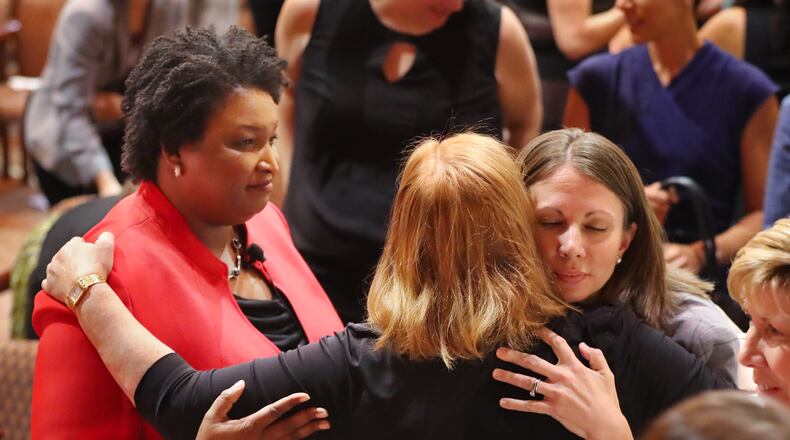We've got a post up this morning on a leaked Stacey Abrams memo that outlines the dynamics of the 2018 Democratic race for governor – an essential goal if the beleaguered minority party is to have any say-so in the redrawing of political boundaries after the 2020 census. A taste:
The memo carried a strong indication that Abrams will attempt to paint [Democratic rival Stacey] Evans as a closet Republican, based in part on a 2012 vote for a bill, now a Georgia law, that requires local law enforcement agencies to auction off confiscated firearms. Evans, like many of Abrams' supporters, admits her vote was a mistake and supports the law's repeal.
Evans is guilty, too, the memo said, of social conservatism. She cast a 2014 vote for a measure that would have authorized public school teachers, students, and staff to say "Merry Christmas," "Happy Hanukkah," or "Happy Holidays" to whomever they please in December.
On a similar topic, the New York Times reports this morning that national Democrats, too, have finally realized that control of state capitols can determine who pulls the strings in Washington:
A Democratic group backed by former President Barack Obama intends to pour millions of dollars into an eclectic array of elections in a dozen states, in an effort to block Republicans from single-handedly drawing congressional maps after 2020, officials leading the group said.
Obama may campaign in some of these targeted states, which include many of the usual suspects – Michigan, Wisconsin, Colorado, Minnesota, Nevada and the like. But here's the penultimate paragraph in the NYT report:
Beyond the traditional swing states, Mr. Holder said his group is eyeing some more daunting targets, including Georgia's open governorship and the Texas Legislature, where Democrats hope to chip away at huge Republican majorities. And the group is monitoring a number of state-level ballot initiatives that could put anti-gerrymandering laws up for a vote this year.
An Athens Banner-Herald report on the topic of gerrymandering earlier this week included this paragraph:
About 51 percent of Georgia voters cast ballots for the Republican presidential candidate, Donald Trump, in the 2016 general election, but Republicans had much larger margins in the Legislature after the election. Republicans control about two-thirds of the seats in both the state House and the state Senate, and 10 of 14 seats in the U.S. House of Representatives - about 71 percent.
***
This week has seen the introduction of House Bill 823, which would "recognize the North Georgia Cherokee Indians as a legitimate American Indian tribe." One of three listed sponsors is state Rep. Terry England, R-Auburn, chairman of the all-powerful House Appropriations Committee.
A museum for the tribe, which would carry a Winder address, is the stated aim. But, of course, in this climate, one must pose the casino question:
“OH HECK NO!!!” was the texted reply from England this morning. “I am actually a member of the group through my ancestry.”
The state of Georgia currently recognizes three Native American tribes:
-- The Georgia Tribe of Eastern Cherokee, based in Dahlonega;
-- The Lower Muscogee Creek Tribe of Whigham, Ga.; and
-- The Cherokee of Georgia Tribal Council of Saint George, Ga.
***
Credit: Bob Andres
Credit: Bob Andres
Gov. Nathan Deal is taking the high road on the Low Bridge.
The governor said Tuesday he's staying out of the debate over whether to change the name of the landmark Savannah bridge in honor of Girl Scout founder Juliette Gordon Low. Hundreds of Girl Scouts were at the statehouse to lobby to strip the name of segregationist Gov. Eugene Talmadge from the eye-catching span.
“I have met with their leadership and I told them this was an issue best addressed by the General Assembly - without my weighing in on it,” he said. “They don’t need my permission or consent to do that.”
He added that the Girl Scout delegation gave him a hat that read: “Man enough to be a Girl Scout.”
“I try to live up to that reputation,” said Deal. “I understand their interest in that, and I think it’s going to be an interesting debate.”
State Rep. Ron Stephens, R-Savannah, is the author of the bridge-naming legislation. The Associated Press adds this paragraph to the stew:
Stephens says his bill has more than 50 legislative supporters and will likely get more, once others realize the bridge was never officially named after Talmadge.
***
The Democratic leadership of the U.S. House is starting to coalesce behind Sixth District candidate Bobby Kaple's campaign -- whether Jon Ossoff jumps in the race or not.
Minority Whip Steny Hoyer recently headlined a fundraiser for Kaple and was joined by U.S. Rep. Sanford Bishop of Columbus. Former U.S. Rep. Allen Boyd was on hand, too.
Kaple, a former newscaster, is one of three Democrats competing to challenge U.S. Rep. Karen Handel, R-Roswell, in November.
She was the victor in last year’s special election to represent the suburban Atlanta seat, beating Ossoff in the most expensive U.S. House contest ever. Ossoff has been tightlipped about his plans.
***
Under pressure to produce ballots in Spanish this election year, due to its shifting population, Hall County is looking to neighboring Gwinnett County for a cost estimate. From the Gainesville Times:
Spanish-language ballots cost Gwinnett County an additional $700,000 last year in its state and local elections.
That figure and others from Gwinnett's experience adopting bilingual ballots in 2017 were discussed in a meeting between Gwinnett and Hall County election officials on Tuesday.






